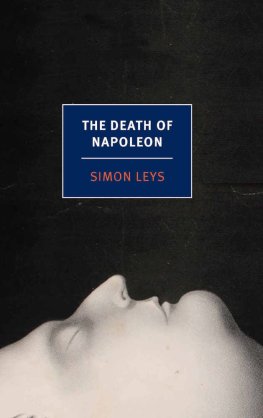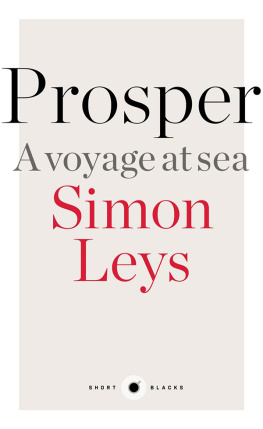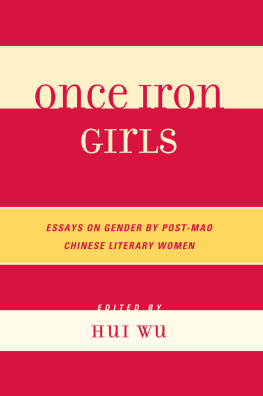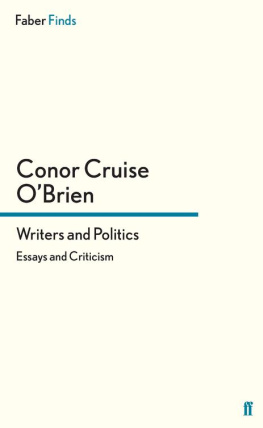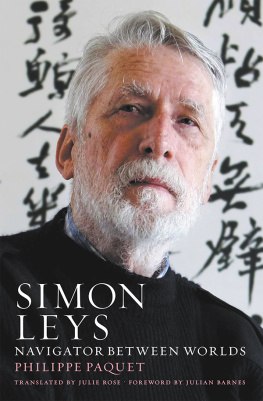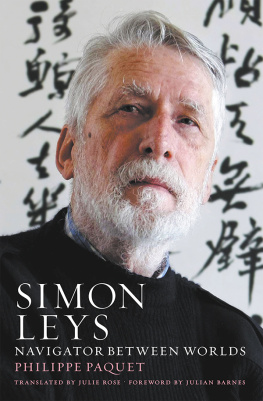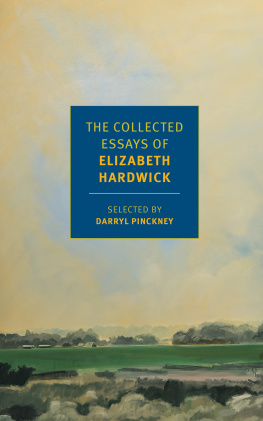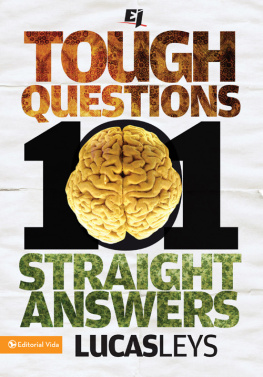SIMON LEYS is the pen name of Pierre Ryckmans, who was born in Belgium and settled in Australia in 1970. He taught Chinese literature at the Australian National University and was Professor of Chinese Studies at the University of Sydney from 1987 to 1993. Leyss writing has appeared in The New York Review of Books, Le Monde, Le Figaro Littraire, and other periodicals. Among his books are Chinese Shadows, The Death of Napoleon (forthcoming from NYRB Classics), Other Peoples Thoughts, and The Wreck of the Batavia & Prosper. In 1996 he delivered the Australian Broadcasting Corporations Boyer Lectures. His many awards include the Prix Renaudot, the Prix Femina, the Prix Guizot, and the Christina Stead Prize for Fiction.
THE HALL OF USELESSNESS
Collected Essays
SIMON LEYS
NEW YORK REVIEW BOOKS

New York
THIS IS A NEW YORK REVIEW BOOK
PUBLISHED BY THE NEW YORK REVIEW OF BOOKS
435 Hudson Street, New York, NY 10014
www.nyrb.com
Copyright 2011, 2013 by Simon Leys
Translations of The Prince de Ligne, or the Eighteenth Century Incarnate, Victor Segalen Revisited Through His Complete Correspondence, The Belgianness of Henri Michaux, and Roland Barthes in China 2013 by Donald Nicholson-Smith
All rights reserved.
Cover image: Mathew Lynn, Pierre Ryckmans II (detail), 2010
Cover design: Katy Homans
The Library of Congress has cataloged the earlier printing as follows:
Leys, Simon, 1935
[Essays. Selections]
The hall of uselessness : collected essays / by Simon Leys.
pages cm. (New York Review Books classics)
Originally published: Collingwood, Vic. : Black Inc., 2011.
Includes bibliographical references and index.
ISBN 978-1-59017-620-7 (alk. paper)
I. Title.
AC25.L53 2013
824'.914dc23
2012044121
eISBN 978-1-59017-638-2
v1.0
For a complete list of books in the NYRB Classics series, visit www.nyrb.com or write to:
Catalog Requests, NYRB, 435 Hudson Street, New York, NY 10014
For Hanfang
CONTENTS
THE HALL OF USELESSNESS
(By Way of a Foreword)
Everyone knows the usefulness of what is useful, but few know the usefulness of what is useless.
Z HUANG ZI
T RADITIONALLY , Chinese scholars, men of letters, artists would give an inspiring name to their residences, hermitages, libraries and studios. Sometimes they did not actually possess residences, hermitages, libraries or studiosnot even a roof over their headsbut the existence or non-existence of a material support for a Name never appeared to them a very relevant issue. And I wonder if one of the deepest seductions of Chinese culture is not related to this conjuring power with which it vests the Written Word. I am not dealing here with esoteric abstractions, but with a living reality. Let me give you just one modest example, which hit me long ago, when I was an ignorant young student.
In Singapore, I often patronised a small movie theatre which showed old films of Peking operas. The theatre itself was a flimsy open-air structure planted in a paddock by the side of the road (at that time, Singapore still had a countryside): a wooden fence enclosed two dozen rows of seatslong planks resting on trestles. In the rainy season, towards the end of the afternoon, there was always a short heavy downpour, and when the show started, just after dark, the planks often had not yet had time to dry; thus, at the box-office, with your ticket, you received a thick old newspaper to cushion your posterior against the humidity. Everything in the theatre was shoddy and ramshackleeverything except the signpost with the theatres name hanging above the entrance: two characters written in a huge and generous calligraphy, Wen Guangwhich could be translated as Light of Civilisation or Light of the Written-Word (it is the same thing). However, later on in the show, sitting under the starry sky and watching on screen Ma Lianliang give his sublime interpretation of the part of the wisest minister of the Three Kingdoms (third century AD), you realised thatafter allthis Light of Civilisation was no hollow boast.
Now, back to The Hall of Uselessness. It was a hut located in the heart of a refugee shantytown of Hong Kong (Kowloon side). To reach it at night, one needed an electric torch, for there were no lights and no roadsonly a dark maze of meandering paths across a chaos of tin and plywood shacks; there were open drains by the side of the paths, and fat rats ran under the feet of passers-by. For two years I enjoyed there the fraternal hospitality of a former schoolmate, whom I knew from Taiwanhe was an artist (calligrapher and seal-carver) sharing a place with two postgraduate students, a philologist and a historian. We slept on bunks in a single common room. This room was naturally a complete messanywhere else it would have resembled a dismal slum, but here all was redeemed by the work of my friend: one superb calligraphy (in seal-script style) hanging on the wallWu Yong Tang, The Hall of Uselessness. If taken at face value, it had a touch of tongue-in-cheek self-deprecation; in fact, it contained a very cheeky double-meaning. The words (chosen by our philologist companion, who was a fine scholar) alluded to a passage from The Book of Changes, the most ancient, most holy (and most obscure) of all the Chinese classics, which said that in springtime the dragon is useless. This, in turn, according to commentaries, meant that in their youth the talents of superior men (promised to a great future) must remain hidden.
I spent two years in The Hall of Uselessness; these were intense and joyful yearswhen learning and living were one and the same thing. The best description of this sort of experience was given by John Henry Newman. In his classic The Idea of a University, he made an amazingly bold statement: he said that if he had to choose between two types of universities, one in which eminent professors teach students who come to the university only to attend lectures and sit for examinations, and the other where there are no professors, no lectures, no examinations and no degrees, but where the students live together for two or three years, he would choose the second type. He concluded, How is this to be explained? When a multitude of young men, keen, open-hearted, sympathetic and observant as young men are, come together and freely mix with each other, they are sure to learn from one another, even if there be no one to teach them; the conversation of all is a series of lectures to each, and they gain for themselves new ideas and views, fresh matter of thought and distinct principles for judging and acting day by day.
I hope I have remained faithful to the memory of The Hall of Uselessnessnot in the meaning intended by my friends (for I am afraid I am not exactly of the dragon breed!), but at least in the more obvious meaning of Zhuang Zi, quoted above. Yet is this second aspiration more humble, or more ambitious? After all, this sort of uselessness is the very ground on which rest all the essential values of our common humanity.
S.L.
Canberra, March 2011
Part I
QUIXOTISM
THE IMITATION OF OUR LORD DON QUIXOTE
I N DEBATES, the word quixotic is nearly always meant as an insultwhich puzzles me, since I can hardly think of a greater compliment. The way most people refer to Don Quixote makes you wonder if they have actually read the book. In fact, it would be interesting to find out whether Don Quixote is still as widely read as the universal popularity of the character would normally suggest. But it could be awkward to conduct such an enquiryespecially among educated people, one often encounters a strange misconception that there are a certain number of books one
Next page

